Can data predict the 2023 Eurovision winner?
Like Marmite, Eurovision is something you either love or hate. But whatever your opinion on the ridiculous, yet entertaining contest, you can’t deny its effect on music lovers across Europe.
Since 1956, The Eurovision Song Contest has been uniting countries annually for over 60 years, celebrating music and culture, and giving fans a chance to predict the next winner and host country. Can’t wait to see who wins? Neither can we!
The Evoluted team has analysed six decades' worth of winners (...and losers) and voting patterns to predict who will take the 2023 crown. We'll take a closer look at Eurovision’s longstanding history and its 69* previous winners to see whether it's truly a reliable predictor of success.
Artist Type
No. 1 Single: Solo acts are more likely to win
Singers have outperformed groups by 44%
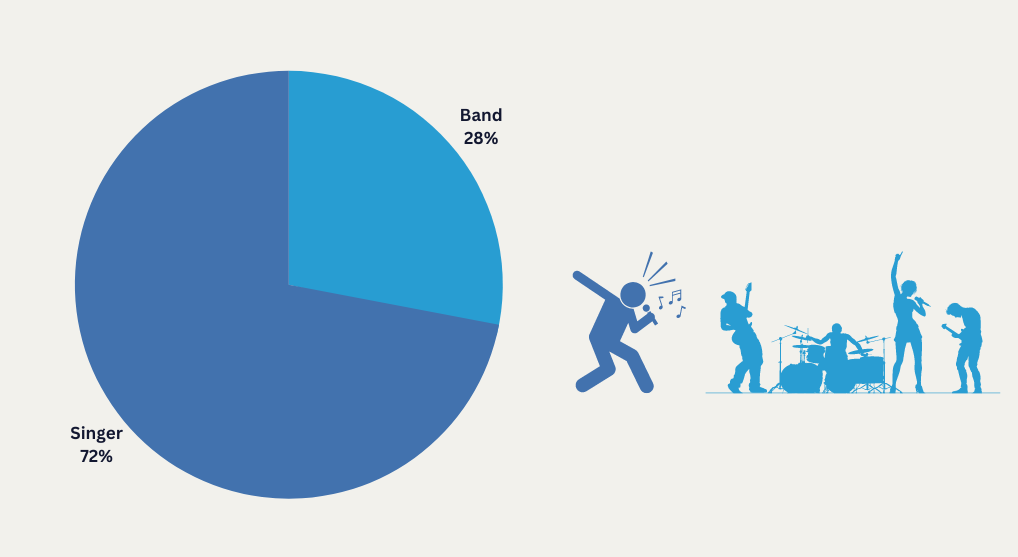
Over its memorable history, Eurovision has seen a fair share of solo acts and groups taking to the stage to showcase their talents. However, Eurovision data reveals audiences have a preference for their acts. Winning statistics show that solo acts have been more triumphant.
Singers have outperformed groups by a significant margin, with a 44% higher chance of winning. This is based on 50 singers (72%) and 19 groups (28%) that have taken the crown.
As solo performers are more likely to command the stage and connect with the audience on a more personal level, this could be why they’re more likely to steal the show.
Eurovision is a woman’s world
Female singers outwin male singers by 32%
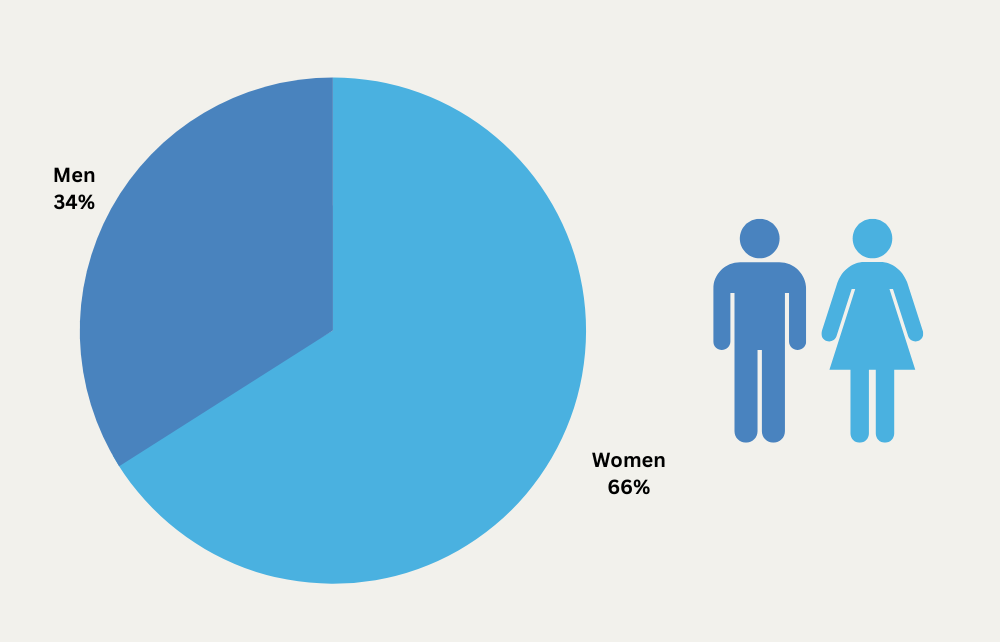
Gender has also been shown to play a role in determining the likelihood of a performer winning. Of the 69 acts (including solo acts and groups) that have taken the crown, more women singers or women-led groups have been featured as the winner.
In fact, research has found that female singers have a higher chance of winning the competition than male singers, outperforming their male counterparts by 32%.
This could be due to a number of factors, including the fact that female performers often have a more diverse range of vocal capabilities, which can allow them to create more dynamic and memorable performances.
Genre Type
Popular for a reason: Pop is winning Eurovision genre
51% of winning acts have been pop songs
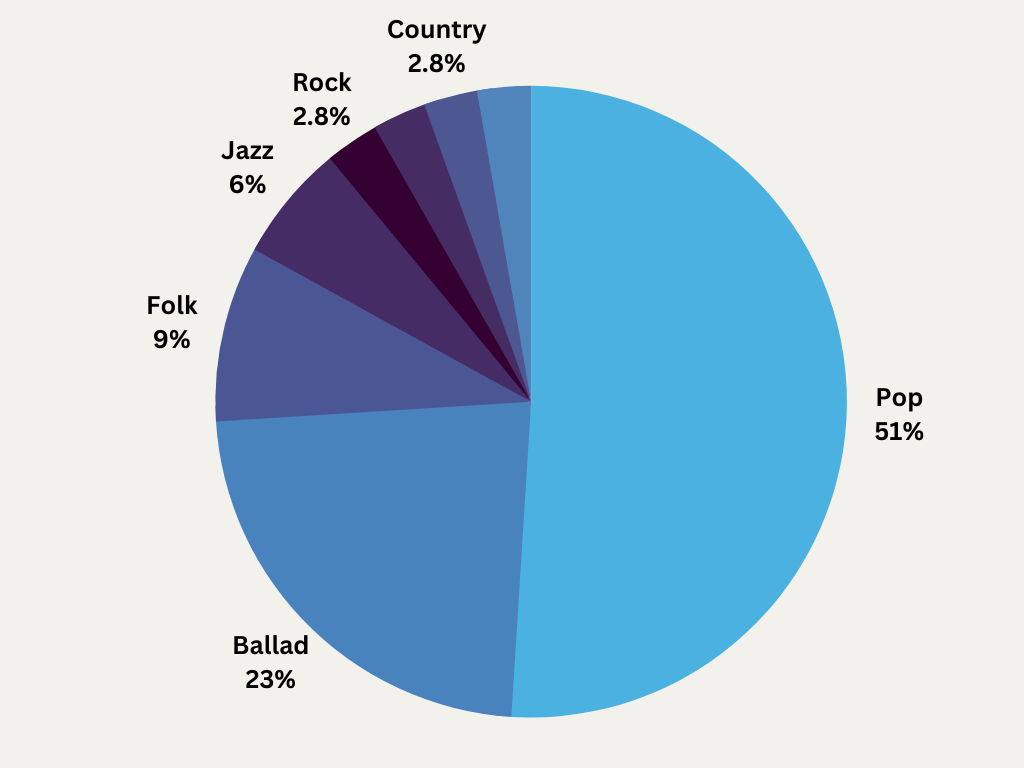
It’s no surprise that pop is the clear winner when it comes to the genre most likely to succeed at Eurovision. According to research, over 51% of winning acts in Eurovision have been pop songs.
As pop music is often more accessible and appeals to a broader audience, it makes sense that this factor can help to increase the likelihood of a song's success in the competition. Eurovision is known for its upbeat rhythms, catchy melodies and very memorable choruses, which can appeal to audiences of all backgrounds.
Even so, while pop music may be the most successful genre in Eurovision, many of the winning acts have incorporated elements of other genres, such as rock, dance and folk music.
| Genre of Act | No. of Winners | Percentage |
|---|---|---|
| Pop | 35 | 51% |
| Ballad | 16 | 23% |
| Folk | 6 | 9% |
| Jazz | 4 | 6% |
| Rock | 2 | 2.75% |
| Dance | 2 | 2.75% |
| Country | 2 | 2.75% |
| Latin | 2 | 2.75% |
Another crowd-pleasing genre is a ballad, as 16 of the acts have won with a slow, powerful love song. As ballads often feature strong vocals and heartfelt lyrics, it means they connect with universal audiences on a deep level and leave a lasting impression, time and time again.
What is the Eurovision love language?
English is the predominant singing language, but there have been 8% more non-English singing winners
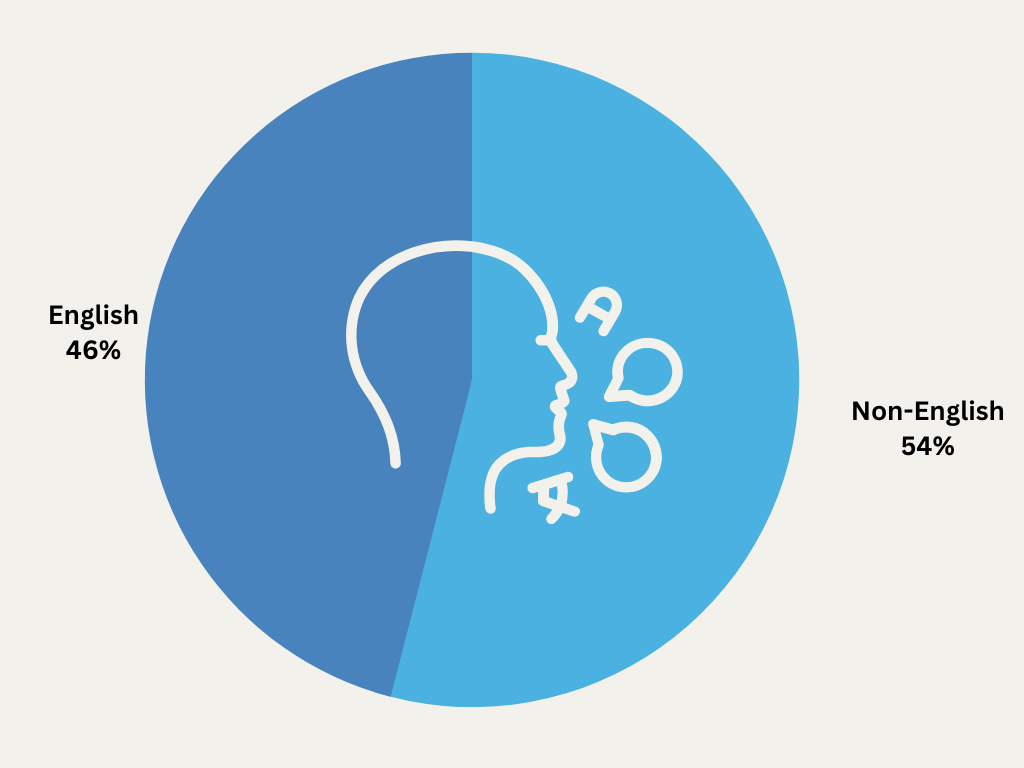
Although many would expect European’s universal language to be the biggest crowd pleaser, it’s actually not a key requirement according to Eurovision’s winners’ record.
And although English has been the most popular singing language, there have been 37 non-English speaking winners, that’s 8% more than the 32 English singing winners.
Is the song’s message political?
Despite Eurovision’s political tag, only 7% of the winning songs have had political connotations
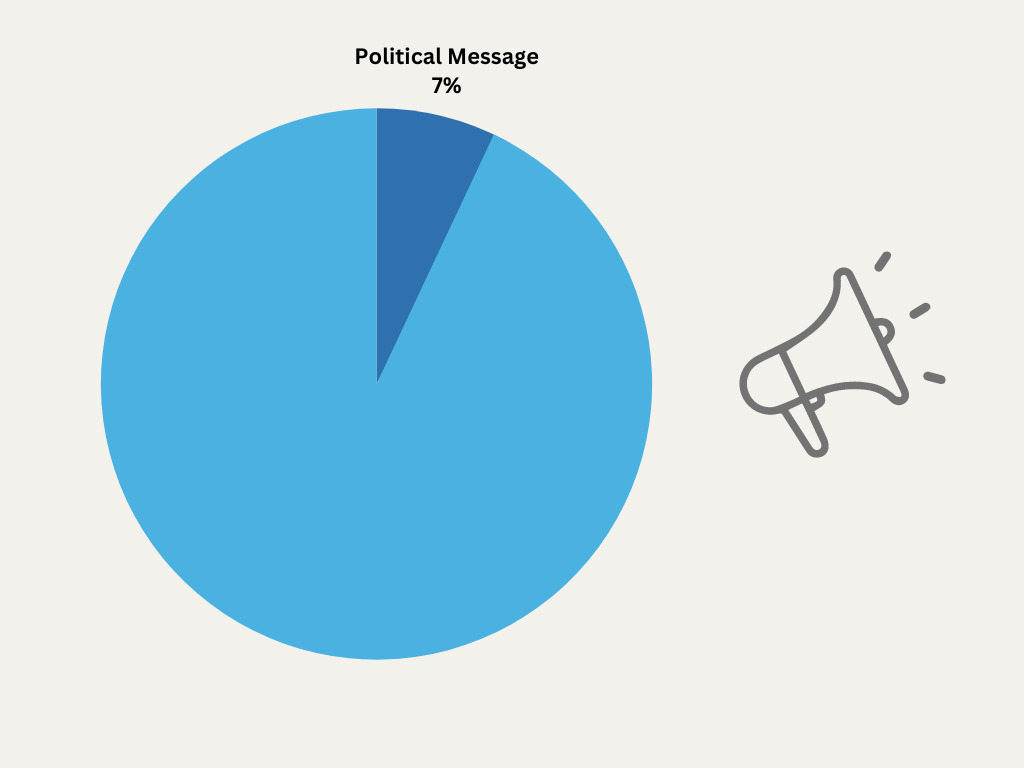
Whether it’s a country’s voting choices, historical ties or political-infused song choice, Eurovision is often known for, and even disliked, because of people’s political perceptions of the show.
However, only a small minority of the contest’s winning acts have purely won because of the song’s popularity, rather than its political connotations. Only 7% (and only 5 of 69) of the winning songs have had a political reference.
One of the most famous examples of this, and a time when Europe unionised in its politics was when Ukraine won the 2022’s contest. While it was undoubtedly the act’s talent and song that helped them take the crown, Ukraine’s situation and the country’s ongoing war with Russia arguably shed sympathy with audiences across Europe.
Italy is most successful point scorer since 2004 vote change
Since 2004, when the voting system allowed countries that didn’t qualify for the semi-final to vote, the points have dramatically increased with winners seeing a score of over 200 each year. From that time, Italy has truly made their mark on Eurovision’s scoreboard and has been the most successful point scorer for nearly two decades.
| Country | Average score since 2004 | |
|---|---|---|
| 1 | Italy | 252 |
| 2 | Australia | 231 |
| 3 | Ukraine | 209 |
| 4 | Sweden | 204 |
| 5 | Portugal | 167 |
| 6 | Netherlands | 163 |
| 7 | Switzerland | 159 |
| 8 | Serbia | 153 |
| 9 | Azerbaijan | 145 |
| 10 | Belgium | 140 |
With an average score of 252 since the 2004 vote increase, Italy knows how to put on a crowd-pleasing show. A most recent example of this was when Maneskin represented Italy in Eurovision’s 2021 contest and received a huge 524 points, winning the public vote with 318 points and coming in fourth place in the jury vote with 206 points. Now, the band have discovered worldwide popularity and are playing arenas across the world.
Sweden has most ever Eurovision points, but Ukraine has best ever average score
Based purely on calculating scores alone, Sweden has had the most ever Eurovision points after making an appearance in 61 of the shows. Although this is a country that has had some of the most appearances, there are countries that have featured in more, these include Germany, the UK, France, Belgium, Netherlands and Switzerland who have appeared in 62 - 65 shows.
| Country | First Appearance | Total score | Average score | |
|---|---|---|---|---|
| 1 | Sweden | 1958 | 5888 | 98 |
| 2 | United Kingdom | 1957 | 4547 | 71 |
| 3 | Italy | 1956 | 4509 | 98 |
| 4 | France | 1956 | 4269 | 68 |
| 5 | Norway | 1960 | 3706 | 65 |
| 6 | Germany | 1956 | 3454 | 53 |
| 7 | Ireland | 1965 | 3428 | 76 |
| 8 | Ukraine | 2003 | 3380 | 199 |
| 9 | Greece | 1974 | 3276 | 82 |
| 10 | Spain | 1961 | 3257 | 53 |
However, since their first appearance in 2003, Ukraine has had the best average score with 199 points. As Australia has been in the contest since the vote increase, however, starting with their first appearance in 2015, they now have the highest average score with 231 points.
Luck of the Irish: Ireland has had the most Eurovision wins
The luck of the Irish extends beyond four-leaf clovers and pots of gold, as Ireland holds the impressive record for the most Eurovision Song Contest wins ever, with seven victories under their belt.
| Country | Debut year | Most recent entry | Entries | Finals | Most recent final | Wins | Most recent win | |
|---|---|---|---|---|---|---|---|---|
| 1 | Ireland | 1965 | 2023 | 55 | 45 | 2018 | 7 | 1996 |
| 2 | Sweden | 1958 | 2023 | 61 | 60 | 2022 | 6 | 2015 |
| 3 | France | 1956 | 2023 | 64 | 64 | 2022 | 5 | 1977 |
| 4 | United Kingdom | 1957 | 2023 | 64 | 64 | 2022 | 5 | 1997 |
| 5 | Netherlands | 1956 | 2023 | 62 | 53 | 2022 | 5 | 2019 |
| 6 | Luxembourg | 1956 | 1993 | 37 | 37 | 1993 | 5 | 1983 |
| 7 | Israel | 1973 | 2023 | 44 | 37 | 2021 | 4 | 2018 |
| 8 | Norway | 1960 | 2023 | 60 | 57 | 2022 | 3 | 2009 |
| 9 | Italy | 1956 | 2023 | 47 | 47 | 2022 | 3 | 2021 |
| 10 | Ukraine | 2003 | 2023 | 17 | 17 | 2022 | 3 | 2022 |
This winning streak was particularly dominant in the nineties when in 1991 the Emerald Isle won the competition three years in a row. Although Norway took the crown in 1995, Ireland returned to retrieve its winning status again in 1996. But, unfortunately for Ireland, this was the last time the country won the competition.
Nul Points: Eurovision’s Biggest Losers

Credit: Netflix
Iceland has never won Eurovision and this was, famously and hilariously, brought to people’s attention in Netflix’s 2020 Eurovision-inspired, comedy film ‘The Story of Fire Saga’ which followed a fictional Icelandic band and their journey in the contest.
They aren’t the only country who have never bagged the winning title, however, as 21 other countries have also never had the crown and, ultimately, hosted the contest thereafter.
Having had the earliest debut and most recent entry, Malta has been the most unfortunate with its losses.
| Country | Debut year | Most recent entry | Entries | Finals | Most recent final | Wins | |
|---|---|---|---|---|---|---|---|
| 1 | Malta | 1971 | 2023 | 34 | 26 | 2021 | 0 |
| 2 | Cyprus | 1981 | 2023 | 38 | 31 | 2021 | 0 |
| 3 | Iceland | 1986 | 2023 | 34 | 27 | 2022 | 0 |
| 4 | Slovenia | 1993 | 2023 | 27 | 15 | 2019 | 0 |
| 5 | Croatia | 1993 | 2023 | 27 | 18 | 2017 | 0 |
| 6 | Bosnia and Herzegovina | 1993 | 2016 | 19 | 18 | 2012 | 0 |
| 7 | Slovakia | 1994 | 2012 | 7 | 3 | 1998 | 0 |
| 8 | Hungary | 1994 | 2019 | 17 | 14 | 2018 | 0 |
| 9 | Poland | 1994 | 2023 | 24 | 15 | 2022 | 0 |
| 10 | Lithuania | 1994 | 2023 | 22 | 15 | 2022 | 0 |
| 11 | Romania | 1994 | 2023 | 22 | 19 | 2022 | 0 |
| 12 | North Macedonia | 1998 | 2022 | 21 | 9 | 2019 | 0 |
| 13 | Belarus | 2004 | 2019 | 16 | 6 | 2019 | 0 |
| 14 | Albania | 2004 | 2023 | 18 | 10 | 2021 | 0 |
| 15 | Bulgaria | 2005 | 2022 | 14 | 5 | 2021 | 0 |
| 16 | Moldova | 2005 | 2023 | 17 | 12 | 2022 | 0 |
| 17 | Armenia | 2006 | 2023 | 14 | 11 | 2022 | 0 |
| 18 | Montenegro | 2007 | 2022 | 12 | 2 | 2015 | 0 |
| 19 | Czech Republic | 2007 | 2023 | 10 | 4 | 2022 | 0 |
| 20 | Georgia | 2007 | 2023 | 14 | 7 | 2016 | 0 |
| 21 | San Marino | 2008 | 2023 | 12 | 3 | 2021 | 0 |
| 22 | Australia | 2015 | 2023 | 7 | 6 | 2022 | 0 |
The winning formula? Past data reveals which acts are most likely to win 2023’s Eurovision

From analysing the contest’s winning history, there are some running themes across the competition’s champions. Data shows there are several recurring elements that have been observed in many of the past winners, such as:
Solo acts are more likely to win
Female singers out win male singers
Pop is the winning Eurovision genre
English is the predominant singing language, but there have been 8% more non-English singing winners
Politics barely influences the contest’s winners
With that in mind, and based on acts that have been announced for 2023’s singing contest, there are two that have the most favourable components.
As an English and pop singing solo act with a catchy, melodic song, Sweden’s representative Loreen has a high chance of taking the crown, while France’s non-English, pop-singing solo act La Zarra who has a slower more powerful ballad song also has a high chance of winning too.
| Ranked by Evoluted | Act | Country | Bookies' Chance of Winning Odds |
|---|---|---|---|
| 1 | Loreen | Sweden | 44% |
| 2 | La Zarra | France | 7% |
| 3 | Alessandra | Norway | 3% |
| 4 | Mae Muller | UK | 1% |
| 5 | Blanca Paloma | Spain | 4% |
And although, famously, Loreen already won the competition back in 2012 with fan-favourite song Euphoria, it won’t scupper her chances of winning the competition as the contest has already seen one act win twice. In 1980 and 1987, singer Johnny Logan took the crown twice for Ireland.
Ranked by Evoluted, based on the report’s highlighted favourability factors and how crowd-pleasing the representatives’ songs are, these are the top 5 acts with the best chances of winning. But while data analysis can provide valuable insights into acts' chances of winning the Eurovision Song Contest, predicting the winner with complete accuracy would be impossible.
What makes Eurovision so exciting is the unpredictability due to the tastes and preferences of the jury and the public, as well as the overall performance and presentation of each act on the night. However, by examining past trends and patterns, and taking into account factors such as song genre, artist popularity, and historical voting patterns, we can make informed predictions and identify potential frontrunners.
Footnote:
*69 Eurovision winners also include 1969’s tie of 4 winners.
Through manual research, the PR team at Evoluted analysed Eurovision’s past winning history to uncover the contest’s running themes.
Our talented Digital PR team is focused on developing creative, results-driven digital PR campaigns and activity to help you boost search visibility and brand awareness. If you think we can help you, get in touch today.





